Graham Reid | | 6 min read
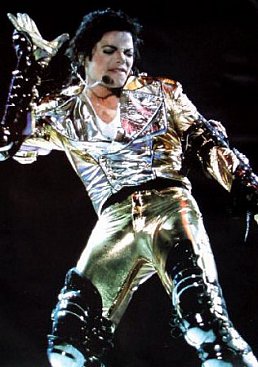
Somewhere around the midpoint of his
often exceptional but undeniably messianic concert in Amsterdam 10
days ago, Michael Jackson fell to his knees and appeared to weep
uncontrollably.
Jackson -- whose stage craft was
impeccable and dancing as exciting as expected -- remained hunched
over and apparently sobbing on the enormous stage for what seemed a
remarkably long time.
But it was a sad moment.
He had just finished singing I'll Be
There, an old Jackson Five number, and on the huge screen behind him
had been projected a series of Jackson Five clips and footage. And
there was the broad-
nosed, cheeky looking black kid that
Michael Jackson used to be, clowning with his brothers backstage,
performing on American television specials, laughing and dancing.
He looked a typical happy child yet, as
we now know from Christopher Andersen's unauthorised biography and
even Jackson's own hints in rare interviews, these were years of
pain, of a childhood denied and emotionally brutalisation by an
abusive, ambitious father.
As the audience of 55,000 in the Ajax
soccer stadium hushed itself into something approaching silence –
punctuated by the occasional de rigeuer scream of “Miy-kaaaal” –
it seemed an opportune moment to turn to Michael Watt whose money was
partially underwriting this tour of Jackson and a support crew of a
couple of hundred and say, “If this guy's really cracked up you're
in serious trouble.”
Watt laughs, the audience remains
silent with expectation and . . . Lo!
He is risen.
Suddenly, Jackson is on his feet naming
his brothers and sister Janet with “I love you all” (noticeably
absent from the list was sister La Toya who broke family ranks and
said the King of Pop should come clean on the child molestation
allegations), then he was off powering through Rock With You and a
show-stopping version of Don’t Stop Till You Get Enough.
Whatever emotion had brought Jackson to
his knees had passed as quickly as it had theatrically arrived.
And the Jackson show -- which runs for
over two hours and touches all musical points in his remarkable
career -- is certainly theatre.
With a barrage of judiciously used
pyrotechnics and other artillery, it comes with the now customary
fact file of statistics that accompany any stadium rock show these
days: a stage weighing almost 10 tonnes which spans 70m and takes
three days to construct; 4000m of cable linking the lights; speakers
and pyrotechnics; a travelling production and personnel team
numbering almost 200, over 200,000kg of equipment . . .
Yet despite that blah-blah of
statistics this HIStory World Tour concert -- named for his last
album, and which doesn't take in the United States as part of the
“world” -- doesn't fall prey to gratuitous lighting displays and
a fire-fight of explosions. When the fires start, machine-guns rattle
and the big gun rolls out - literally - they are all part of a
tightly scripted, brilliantly choreographed event.
And Jackson's show is certainly An
Event.
From the pre-concert tapes of classic
Motown hits -- Jackson clearly linking himself with the lineage of
great black music - through the militaristic choreography of the
opening numbers (much flag waving and precision marching/dancing,
heavily borrowed from sister Janet's recent career it must be noted),
the HIStory show lends itself to analysis beyond the enjoyment it
undeniably provides.
As with the Queen, the 38-year-old King
of Pop seems to have always been with us and his 30-year career can
now be reduced to iconography: the moonwalk; the bejeweled glove; the
hat; the wind-blown white shirt over the white T-shirt . . . These
and other images are familiar to us.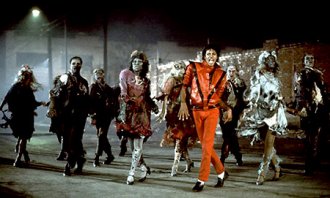
Who doesn't remember that brilliant music with producer Quincy Jones, the Thriller video or Billy Jean and the moonwalk dance?
Through video montages projected on the
enormous back-screen the HlStory concert reminds us of all these.
It is also video made flesh in places
as Jackson, in a series of set-piece dance routines and frozen poses
under the spotlights, both recalls and embellishes the images which
have imprinted themselves in our collective consciousness.
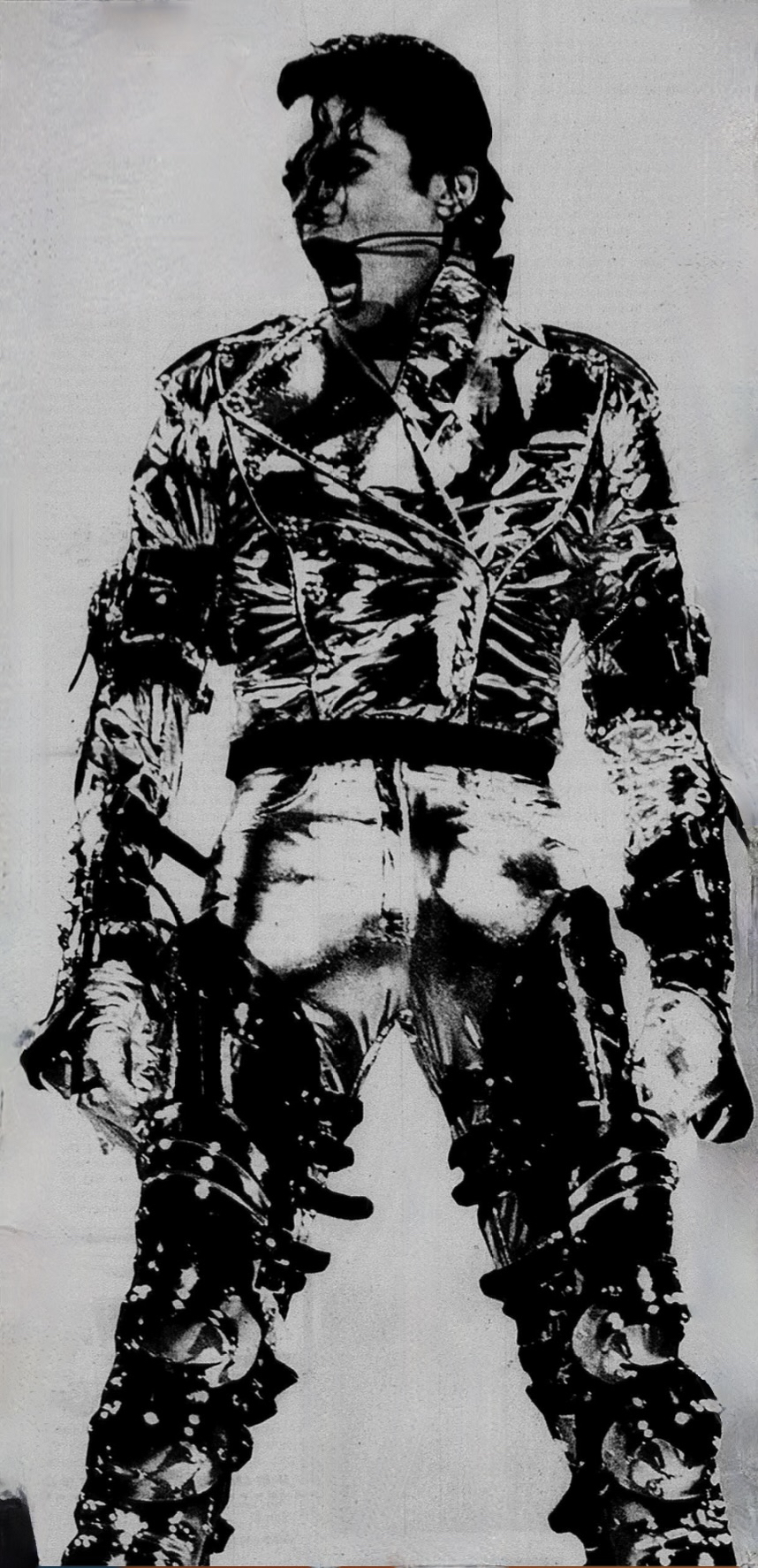 And Jackson, with canny stage
sensibilities, daringly recreates these images and often surpasses
them: here the on-stage video is projecting just the glove onto the
25m-high screens at the sides of the stage; then it is simply on his
feet, later it freezes the image of Jackson standing in a whirlwind
of dry ice which mimics his appearance at the Superbowl three years
ago . . .
And Jackson, with canny stage
sensibilities, daringly recreates these images and often surpasses
them: here the on-stage video is projecting just the glove onto the
25m-high screens at the sides of the stage; then it is simply on his
feet, later it freezes the image of Jackson standing in a whirlwind
of dry ice which mimics his appearance at the Superbowl three years
ago . . .
To invite comparisons with your video
is a risky business in pop – witness the number of live acts who
are unfailingly disappointing after their clips – but Jackson
matches them point for point.
His dancing, full of that angry energy
few others have even attempted, is little short of astonishing. But
of equal note is his voice, of ringing clarity in the ballads,
searing in material like Billy Jean and Smooth Criminal -- which
comes complete with Depression-era suits and a choreographed
shoot-out that recalls the St Valentines Day Massacre.
And Jackson's show doesn’t shirk from
its violent aspects: torchlight and uniforms of fascist persuasion
early on; S&M masks in Come Together; mass destruction that
echoes both the fall of the Berlin Wall and, perhaps to a lesser
degree but equally, appropriating from the pop culture of Pink
Floyd’s The Wall . . .
At the centre at all times, however, is
Jackson, his band reduced to anonymity behind him, except in sections
where he quits the stage and leaves the video projections to carry
the imagery. It is these montages -- Jackson clips intermingled in a
post-modernist's nightmare with pictures of starving children, Nelson
Mandela, Mother Teresa and others -- which slow the momentum of the
show and also reinforce how much Michael Jackson has become dependent
on placing himself at the emotional and political centre.
Jacksons world view -- often laughable
in its simplicity, some would say disturbingly Christlike as well --
is distilled in his songs. While he may not directly address his
audience (no “Good evening Amsterdam!” tonight) his gestures and
lyrics are general if not universal.
There’s something appealingly
inclusive for an audience, especially those who feel emotionally
disenfranchised, in songs which say, “They don’t care about us",
“What about us?" and “You are not alone."
But when Jackson ends his rock’n’soul
concert with an image of himself as possible political martyr and a
galling image as the Light of the World and saviour of the suffering
children, it is too much to swallow.
You have to admire his nerve, however:
he has consciously reminded you in that Jackson Five footage that the
message “it doesn’t matter if you’re black or white” is
hypocritical; that the distinction between reality and fantasy is
blurry if non-existent in his world and that crowd manipulation,
sometimes cynical, is just part of the contract now.
The tragedy is, the HIStory concert
rides on a soundtrack of some of the finest rock’n’soul music of
the past two decades and is fronted by a dancer who has won the
admiration of Gene Kelly, Fred Astaire and more than a decade of MTV
viewers.
There's an old joke about rock'n'roll:
it's entertainment, it isn't about world peace.
Yet Jackson -- for all his manifest
brilliance as a performer and songwriter -- admirably, sadly and
somewhat naively perhaps, thinks (or wants us to believe) it is.
In Michael's enclosed world, maybe it
is?

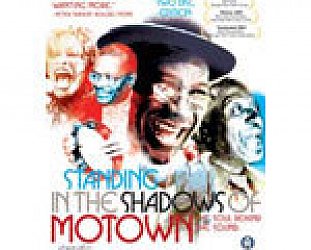

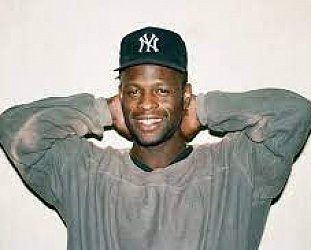
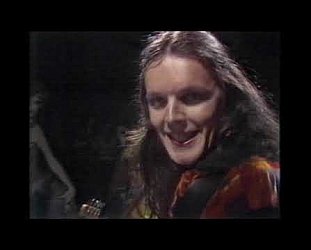
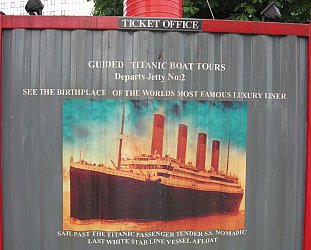
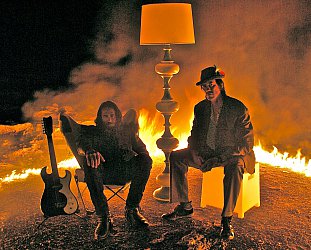
post a comment